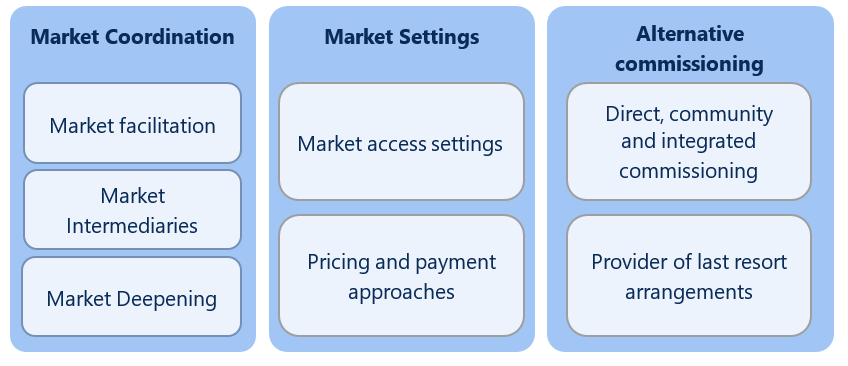Markets are not the only (or necessarily the most important) tool available to governments. Rather, NDIS markets should be designed to complement, and not replace, the underlying scheme design elements (Figure 4).
The role of markets in the NDIS
The development of the NDIS market is not an end in itself. Rather, the NDIS market – if appropriately designed – is a tool that can encourage service providers to be more effective in achieving outcomes for participants (Figure 5).
To achieve these objectives, governments should monitor NDIS markets and intervene when necessary using a range of market tools (Figure 6). They need to monitor outcomes and carefully balance considerations of efficiency, effectiveness and equity.

However, our work on improving access to services for remote and First Nations communities found that NDIS markets are not functioning well. We found governments need to take an active and flexible approach to market stewardship.
The poor market outcomes in the NDIS (outlined in Section 1) reflect in part a lack of a clear, coherent and transparent strategy to steward the NDIS market. Governments – the NDIA, NDIS Commission, Department of Social Services and states and territories – have not implemented clear roles and responsibilities to develop the NDIS market.
Back to topGovernments must understand the nature of participants, supports and providers and apply a mix of market tools when designing market approaches
The NDIS is not one market, but a complex system of ‘sub-markets’.
The approach to service delivery and market stewardship needs to reflect the nature of participants, supports and providers in each sub-market (including, for example, in remote and very remote communities) (Figure 7). For example, governments may take a different approach when setting out the rules and procedures across:
- Core supports – these supports (particularly for personal care) depend heavily on relationships. Support needs can vary across participants (for example, between children and adults). Typically these are ongoing, need to be delivered face-to-face and, ideally, are provided by stable staff who deeply understand the participant and their needs.
- Capacity building supports – these supports depend heavily on trusted relationships and professional opinions and should be based on evidence of best practice. Providers are also likely to have opportunities to deliver in other sectors, such as health and aged care.
- Capital supports (such as, assistive technology) – these supports are often one-off in nature. Participants and regulators, therefore, may need professional advice given a huge range of alternatives and the often specialised nature of these supports.

